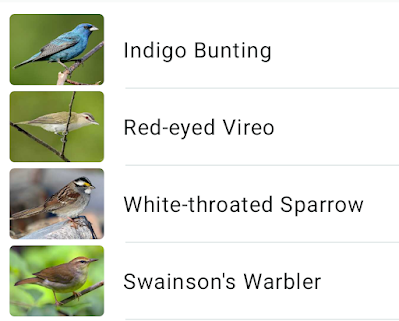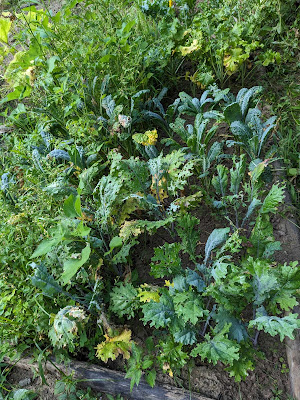why mulch?
There are SO MANY reasons to mulch that you know I won't think of all of them.
But here is the beginning of our sweet potatoes this year, before
and after mulching.
If I looked really hard through my photos, I could find cabbages before and after, and how happy they were, and how big they grew right after being mulched.
Why mulch? First to feed the soil. Never farm plants; always farm soil. If you have soil, you can grow anything. Bonus, this is "capturing carbon".
Mulching slows or smothers weed growth, and what still grows, it makes them easier to pull up (and pulled up weeds, put into compost, are just more carbon).
It holds moisture for the plants if there are a few days without rain, and it also cools the soil so baby transplants don't get cooked when you first put them out.
A covering over the soil prevents erosion. You might not think erosion is a big deal in your garden, but watch a video on the dynamics of a raindrop hitting bare soil vs soil that has any protection.
If you've worked much in living soil, you know all the critters it shelters. Mulch provides food and shelter for all these critters and for the microbes and mycelium and who knows what all else.
You can use most any organic material for mulch. Right now, we are using primarily grass clippings. We have a small push mower that bags, and we mow a little along (it is not easy mowing because it is TALL, and sometimes bumpy). We get a bucket of clippings for the rabbits and then mulch *something*. We like the grass clippings because *we have them* and they are quick to incorporate into the soil. We have used sawdust (because we had access to an insane amount of it) and wood chips (the Asplundh guys came around one year), and we've probably used stuff that I'm forgetting right now.
Mostly, the mulch is to help things get started. The cabbage that I mentioned above? You can't see the dirt on the bed it's growing in now because the cabbages all touch each other. Occasionally, a tall weed will make its way through, but then it's easy to pull it up. Those sweet potatoes? I'll need to pull a few morning glories out of there, and some burdock is likely to rear its head, but before long, the sweet potatoes will be laughing at any upstart weeds, and mulching then isn't necessary.
When we don't have baby plants to mulch, what do we do with the clippings? Well, we might just not mow anymore. Or keeping the orchard and right around the garden mowed, we will turn that mulch to the trees and blueberries. They might have liked the mulch earlier, but you have to have priorities.
I get excited seeing how the mulch really perks things up. I hope you do too, and that your garden beds become so rich that they grow all sorts of weeds and welcome all sorts of bugs.















